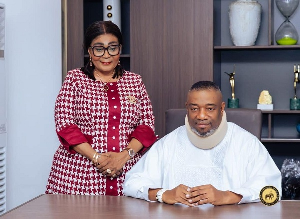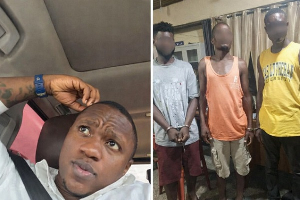Over the past few days, the Ghanaian media has been dominated by discussions and debates over a bribery allegation involving the sitting president, John Dramani Mahama. An investigative reporter from a local private radio station, Joy FM, had alleged that a Burkina Faso national - Djibril Kanazoe who is President and Director-General of Groupe Kanazoe - gave a Ford Expedition valued at US$100,000 to President Mahama in 2012 after he had won two construction contracts. One was to build a wall around a piece of land for Ghana’s Embassy in Burkina Faso at a cost of US $650,000. The other was construction of the Dodo Pepeso-Nkwanta road in the Volta Region worth €25.9million.
As to be expected, this allegation has generated intense debate within the country’s body politic, with some opposition parliamentarians from the New Patriotic Party (NPP) hinting at initiating impeachment proceedings against the President. Others from civil society, including the anti-corruption body Ghana Integrity Initiative (GII), have called for full disclosure from government.
In response, government - in a statement issued by the Communications Ministry - confirmed that the said vehicle was indeed donated to the President by the Burkinabe national as a gift; but explained the gift in no way influenced the decision taken by government to award subsequent contracts to Mr. Kanazoe. Government’s statement added that the said Ford Expedition has been put into a pool of vehicle at the presidency. This issue and the public commentary and debates it has generated raises serious issues regarding ethical conduct of public officials and transparency in the country’s governance process and within the context of democratic good governance.
Gifts, bribes and ethics
An important aspect of the revelations regarding the car-donation to the President borders on the conflict of interest and ethics. According to Article 284 of Ghana’s Constitution, “a public officer should not put him or herself in a position where his or her interest conflicts with the functions of his or her office”. Thus, for many, the question is whether or not receipt of the gift from the Burkinabe contractor could in any way put the President - and for that matter government - in a situation where they would be unable to perform their duties as public officials.
Thus, while each side will advance arguments to support their stance, it is important to apply the law and relevant regulations that prescribe codes of conducts and ethical behaviour for public officials. All over the world leaders receive gifts on a regular basis; but in every country there are established frameworks and mechanisms governing or regulating such gifts. Because public officials are humans, it is possible that certain people may use one form of gift or another to influence their judgment either directly or indirectly.
It is for this reason that in many advanced democracies there are thresholds of what can be considered acceptable gifts for public officials. In many such countries the law requires public officials, including Heads of State and all senior public officials, to register all gifts in a public depository. In the case of Ghana, and indeed many African and emerging democracies, sometimes it is not the lack of such laws and regulatory frameworks but rather the willingness to comply and apply.
For example, within Ghana’s current democratic and constitutional dispensation, there are many of such provisions regarding the ethical conduct of public officers -- including provisions in the Constitution itself as well as specific codes of conduct for all public officials. The main challenge is the interpretation and application of such provisions and codes of conduct. As this Burkinabe car donation episode has shown, those in authority will find ways to explain away and rationalise what some may see as a gross violation of the law and a breach of ethical standards and acceptable codes of conduct.
And this is not by any means the first time this has happened in the country’s recent political history. In 2001, there was a media furore over the use of public funds by the newly-installed President John Kufuor to renovate his private residence. In the midst of the thunderstorm of public criticism, an unknown private citizen and self-described farmer, one Mr. Marfo, presented 41 million cedis to settle the amount spent on the renovations works at the president's private residence. While this could just be a genuine act of generosity and kindness by a good-spirited individual, it raised all kinds of ethical concerns at the time.
But like anything else in this country, it eventually blew over and life continued. As a people, and as part of consolidating our democratic process, it is important to transcend the tendency to score political points with every issue by relying on existing institutional mechanisms to resolve issues regardless of who is involved. Presidents and ministers are humans with their own flaws, weaknesses and limitations. They are as fallible as the rest of us, and where they fall short they should be made aware and the necessary remedial actions taken in the broader national interest.
The act of gifting is no doubt ingrained in our culture, just as is the case with other societies elsewhere in the world. Yet, like every cultural practice, it has its own set of challenges; particularly within the context of democratic good governance. There is always an expectation of reciprocity or what may be described as “one good turn deserves another”!
In 2009, the late President John Atta Mills announced his decision not to accept traditional Christmas gifts such as hampers with an explanation that: “You never know what is in the mind of the gift’s giver, so it's always better not to accept them”. This could be interpreted as a sign of leadership and recognition of our human weaknesses even as leaders in certain situations, and hence the need to guard against certain tendencies which have the potential to compromise and undermine the broader public interest.
Dangers of state capture
This ongoing discussion brings us into the realm of the growing menace of state capture by some powerful individuals and interests in society for their private gain. Again, this is not peculiar to Ghana and for that matter Africa’s emerging and fragile democracies. But unlike the advanced democracies where there are clear guidelines and strict application of the rules, our countries are works in progress -- with institutional weaknesses and the dominance of personal rule.
Take for example the issue of political party funding: whereas in the United States of America (USA) and other advanced democracies there are clear guidelines for political donations as well as periodic audit and publication of party finances, in our part of the world this is a “no go” area with all major parties always defaulting in the statutory declaration of their finances. Thus, in the absence of state funding for political parties, our political parties are left to their own devices -- and in such a situation, there is a real danger of the state lacking ability to regulate the financial activities of political parties or track the sources of funding for such parties.
We have heard politicians from both sides of the political divide, on countless occasions and at various periods in our recent political history, recount the excruciating challenges of life in political opposition. There is a perception and maybe reality that parties in government tend to do very well in terms of financial mobilisation than those in opposition. And this is not by accident. As has been written in this column before, one of the acceptable practices in our contemporary society is the unwritten rule or requirement of a10% deduction on any transaction or contract, both public and private -- and that is the way it goes.
This is yet another element or demonstration of our ability to bypass and truncate laid-down procedures and principles of good conduct for personal and selfish gain. And here again, all are guilty - including those who are the loudest on various media platforms pontificating a holier-than-thou attitude. As has been reported recently in Jacob Zuma’s South Africa regarding the role and influence of the powerful Gupta family, or what became known as the Zuptas, powerful individuals have the potential and capacity to exert so much power and influence over the governmental process - including the important business of ministerial appointments - once such individuals are made to gain access and control over those in power through monetary inducements.
And that is the real danger we need to be wary of as we strive to consolidate our democracy and build a more equal and just society through the implementation of transformative and people-centred policies. President Mahama’s Ford Expedition in Burkina may not result in his impeachment or impact the outcome of the 2016 general elections; but it can help start a national conversation on crafting a harmonious marriage between unwritten norms and cultural practices of gifting on one hand, and the application of ethical codes of conduct in a rules-based constitutional democracy on the other hand.
*Lord Mawuko-Yevugah is a Political Economist, Author and Senior Lecturer at the GIMPA School of Public Service & Governance.
He studied as a Commonwealth Scholar at the University of Cambridge.
Email: lord.mawuko@gmail.com
Opinions of Monday, 20 June 2016
Columnist: Lord M-Yevugah,PHD















